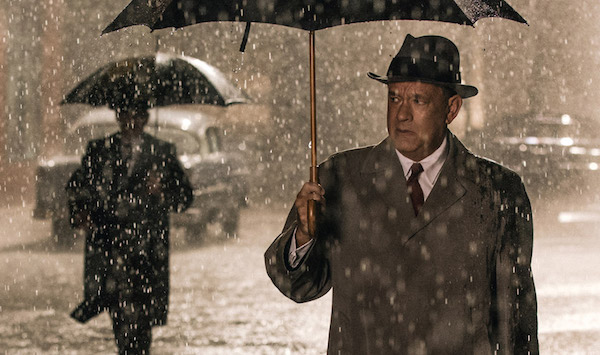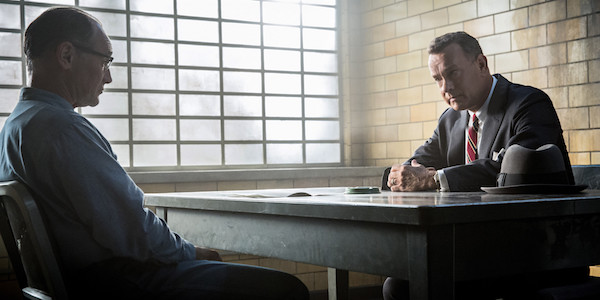
I’m finding it difficult to make any further argument as to why you should go see Bridge of Spies. It’s Spielberg directing. Hanks is the lead. The Coen brothers did significant work on the script. C’mon. You should be in the theater right now. But hey, I write film criticism and I would feel silly for not writing about this flick, especially because it’s pretty darn good.
Based on true events, the story begins in New York in 1957. When a Soviet spy (Mark Rylance) is apprehended by the FBI, ace insurance lawyer Jim Donovan (Hanks) is asked to defend the spy in court. While Donovan tries to keep his client out of the electric chair, two new wrinkles develop — an American U2 pilot is shot down over Turkey and captured by the Soviets, and an American student is arrested in East Germany. Sent to East Berlin by the CIA, Donovan is tasked with trading the spy for the two captive Americans, but will he be able to safely negotiate the trade? If you know the true story, then you already know the answer. But like all good movies based on true stories, the pleasure isn’t in the facts. It’s in how the facts are made into fiction.
The fiction starts beautifully. Bridge of Spies has one of the year’s best opening sequences, following Rylance’s spy through New York as he’s tracked by FBI agents. There’s hardly any dialogue, and it’s masterfully cut together by Michael Kahn. That’s to be expected — Kahn, like Spielberg, is a master. We expect Spielberg’s films to be masterful. There are standards of quality that we know his films will exceed by default. The standard of enjoyability is what fluctuates with Spielberg, and lately it hasn’t fluctuated much at all. There’s a high probability that you’ll get what you’re expecting here, and because of that, you’ll find delight. What you won’t find is surpise.

Bridge of Spies hits all the right notes. It’s not messy at all, and it’s less interesting for it. It’s a broad and pleasant film that, while being two-and-a-half hours very well spent, lacks nuance in many aspects. It’s patriotic in an almost maudlin way, which certainly isn’t helped by Thomas Newman’s score: rat-tat-tat snare rolls for the miltary scenes, men’s choirs for the Soviets, and stately horns for Donovan’s speech at the Supreme Court. Things unfold as they should: Janusz Kaminski’s doing his soft whites on deep blacks thing, so it looks great from frame one. It’s paced well; no moment lasts any longer than it should. Every performance (especially Rylance, but of course Hanks, too) is as close to great as it needs to be, and the film is loaded with that easily digestible dry wit that Spielberg does so well (I’m sure the Coens’ work helped). It’s almost as safe as it is good.
The film’s few unconvential aspects are what really distinguish it. Bridge of Spies spends a lot of time with characters that are speaking Russian or German, and the film employs no subtitles. Spielberg has omitted subtitles before, but perhaps not to this effect. Even though Donovan speaks German (haltingly, but well enough) we are always left to infer what is being said. It really helps to sell the confusion and frustration that Donovan must be feeling in Germany, especially when he loses his way in the bitter cold and gets menaced by a group of young thugs.
Aside from a few unexpected curveballs like that, this feels like Spielberg playing it safe. He’s got a rock-solid cast and a crew of masters with him behind the camera. Bridge of Spies isn’t a pompous prestige film. It’s quality filmmaking, but it’s soft and squishy in all the right places that American audiences will love. This is Spielberg, the Coens, Kahn, Kaminski, and Hanks playing the hits. But when they put on a show as good as Bridge of Spies, it’s hard to argue that they should be doing anything else.
Travis’ Rating: 




Out of a Possible 5 Stars